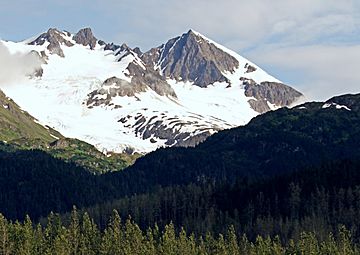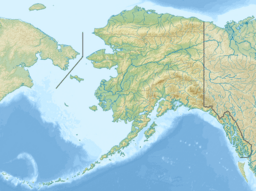Phoenix Peak (Alaska) facts for kids
Quick facts for kids Phoenix Peak |
|
|---|---|

NW aspect from Resurrection River valley
|
|
| Highest point | |
| Elevation | 5,187 ft (1,581 m) |
| Prominence | 3,350 ft (1,020 m) |
| Isolation | 5.67 mi (9.12 km) |
| Parent peak | Mount Alice |
| Geography | |
| Location | Kenai Fjords National Park Kenai Peninsula Borough Alaska, United States |
| Parent range | Kenai Mountains |
| Topo map | USGS Seward A-7 |
| Climbing | |
| First ascent | 1964 by Don Stockard |
Phoenix Peak is a tall mountain in Alaska, standing at about 5,187 feet (1,581 meters) high. It is part of the Kenai Mountains on the Kenai Peninsula. This amazing peak is found inside Kenai Fjords National Park.
The mountain is located near other important landmarks. It is about 2 miles (3 kilometers) southwest of Mount Benson. It is also about 1.1 miles (1.8 kilometers) northwest of Marathon Mountain. The city of Seward, Alaska is about 3.5 miles (5.6 kilometers) to its west.
How Phoenix Peak Got Its Name
Phoenix Peak was named in 1965 by the Mountaineering Club of Alaska. It was named after the ship Phoenix. This ship was special because it was the very first ship ever built in Russian America. It was built in 1794 by Russians in Resurrection Bay, which is nearby.
The name of the mountain became official in 1966. This was decided by the United States Geological Survey, which is a government agency that studies the Earth.
First People to Climb Phoenix Peak
The first time someone successfully climbed to the top of Phoenix Peak was on July 23, 1964. A climber named Don Stockard made this first ascent. He was a member of the Mountaineering Club of Alaska.
Climate Around Phoenix Peak
Phoenix Peak is located in a subarctic climate zone. This means the area has very long, cold, and snowy winters. The summers are usually mild.
During winter, temperatures can drop very low. They might go below -4 °F (-20 °C). With the wind chill, it can feel even colder, sometimes below -22 °F (-30 °C).
Water from the mountain and melting ice from its glaciers flow into streams. These streams then join the Resurrection River.
The best time to visit and see Phoenix Peak is usually in May and June. The weather is often clearer then. If the weather is good, you can even see the huge Harding Icefield from the mountain's summit!
 | Bessie Coleman |
 | Spann Watson |
 | Jill E. Brown |
 | Sherman W. White |


